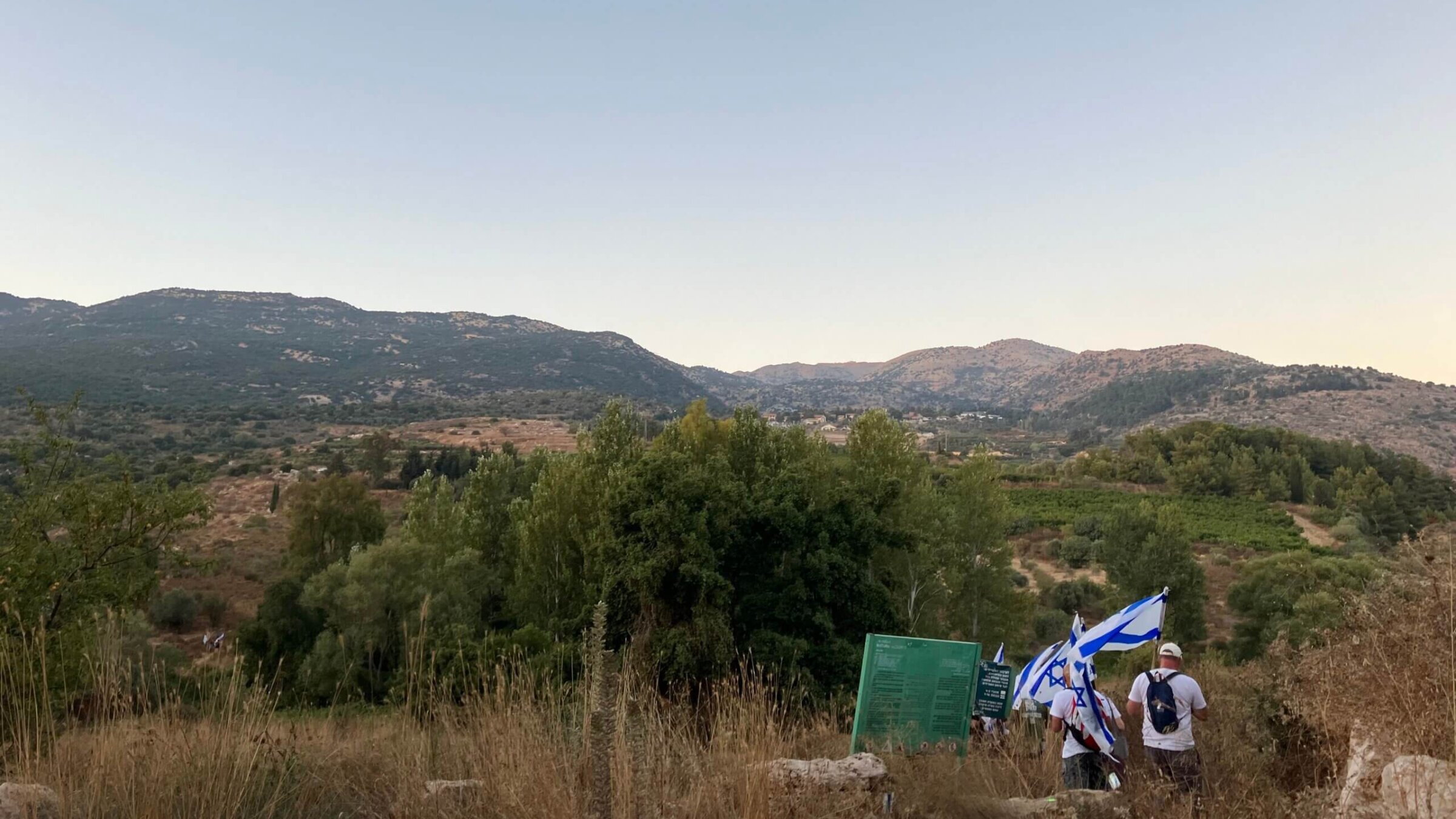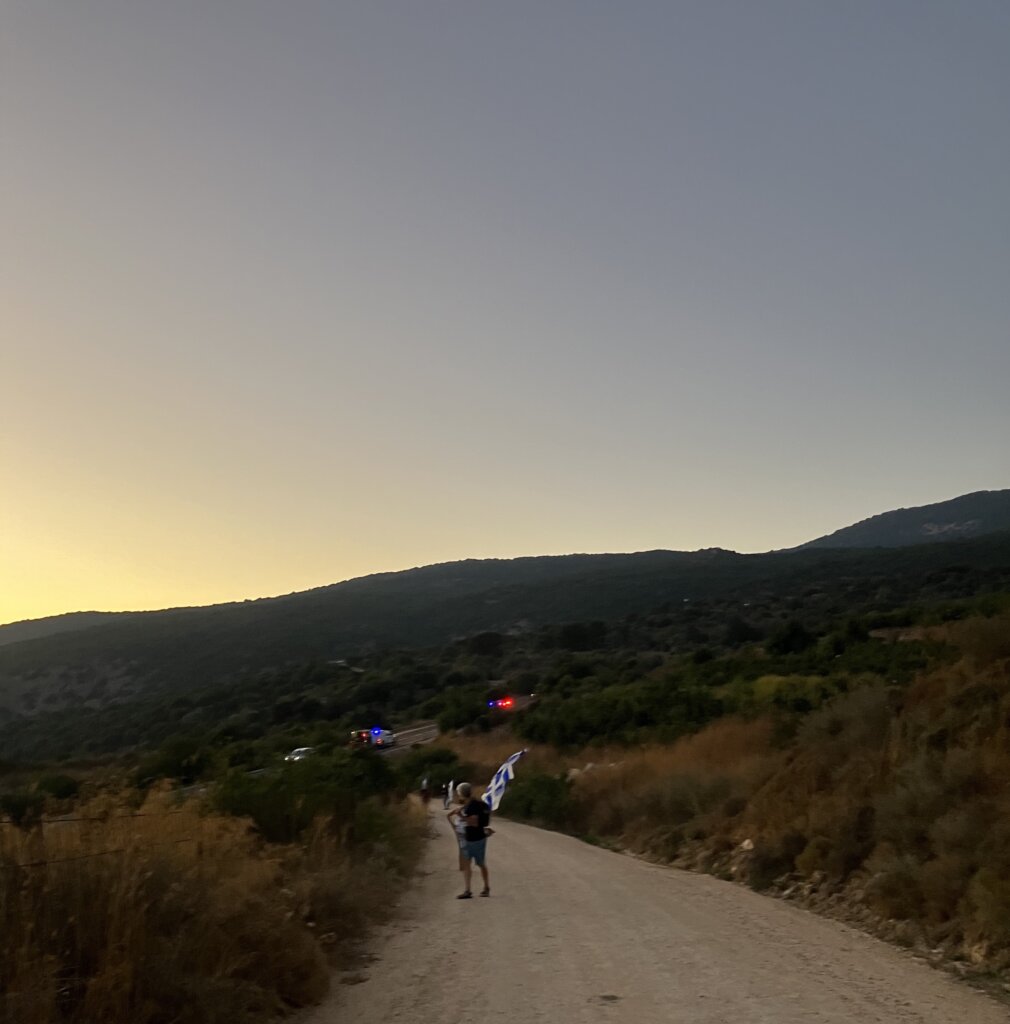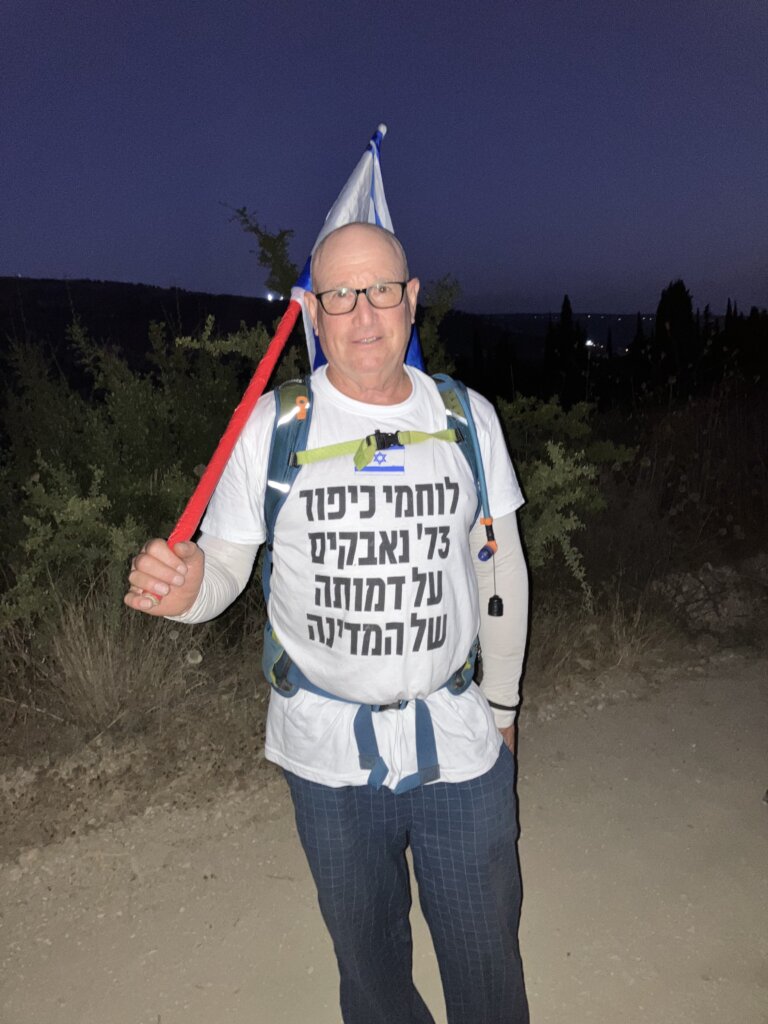Benjamin Netanyahu is on vacation — these protesters followed him there
Heavy police forces met protesters at Neve Ativ, a moshav in Israel’s northern mountains where the prime minister is vacationing

Police blocked the entry to Neve Ativ, where Netanyahu was staying on vacation, so protesters began to hike several kilometers up the mountain toward the village. Neve Ativ is visible in the distance. Photo by Mira Fox
NEVE ATIV, Israel — The road into Neve Ativ, a moshav (small village) on Israel’s northernmost border, was blocked on Monday night. A police car was parked across the lanes, with officers checking every car, only letting residents and guests of hotels ascend the remaining few kilometers to the moshav.
The security measures were in place because Benjamin Netanyahu, Israel’s prime minister, and his wife, Sara, were vacationing at a hotel there, Hotel Panda. And protesters had arrived in droves to keep them from getting any peace — or, as one protester said over a megaphone, resting their “sun-shriveled hearts.”
For six months now, Israeli citizens have been pushing back against the government’s attempt to overhaul the country’s judiciary with loud protests each Saturday night. But other protests have been taking place nearly every day of the week — outside ministers’ houses, in small squares, and, yes, wherever a government official is on vacation. Last week, protesters even gathered in Cyprus, outside the hotel where Itamar Ben-Gvir, Israel’s national security minister, was staying.
I’d heard about the protest when a friend sent me a screenshot of a poster someone had sent in a WhatsApp group. “Bibi and Sara are coming to vacation in Neve Ativ. What, are we going to let them be in peace?” it read. “Everyone is coming to erect tents in Neve Ativ on Monday. Free camping in the most beautiful place in Israel — and we can’t promise it will be quiet.”
The poster had a link to another WhatsApp group, but when I tried to join to get further details, I got a pop-up alert that the group was full, with more than 1,000 members.
Israel’s protests are astonishingly well-organized. When the throngs set out on a recent march from Tel Aviv to Jerusalem to protest the Knesset’s passage of a law limiting the court’s power, they didn’t have to carry tents or food — supporters met them along the way with supplies. But since organizers and protesters rely on an intricate web of private WhatsApp groups to convey information, it can be hard for an outsider to know what’s going on.
With roads blocked, protesters travel by foot
Unable to get further details, I set out on what turned out to be a four-hour drive from Jerusalem to Neve Ativ in heavy traffic. On my way, a motorcade of black cars — a mix of sedans and SUVs — with flashing sirens went by, a sign that I was on the right track.
When I arrived, the parking lot at the junction was packed with at least 100 cars, and more were beginning to line the steep road up the mountain. “They’re forbidding cars, but you can enter on foot,” a woman told me as she passed me walking with an Israeli flag.

Past the police, near a marked trailhead, there were crates of fruit and water, and a folding table of sandwich fixings. An Israeli man named Yaakov, who now lives in Miami and said he bought a one-way ticket back to Israel to participate in the protests, told me this was the trail was where we’d be walking. To circumvent the police, protesters were hiking down into a small valley, then back up the mountain to the moshav, which was barely visible in the distance.
As the sun set, small groups took turns setting off down the rocky trail. I walked with Yaakov. At each intersection, the group in front of us would wait, planting their flags in the ground until they were sure we behind them had seen where to go.
We climbed up through an olive grove and crossed the paved road to the moshav; at each turn, people stopped to strategize, telling other protesters where the police were now, and how to get through. As we ascended above the road, more police vehicles, lights flashing and carrying water cannons and horses, drove up the mountain, causing murmurs to spread through the group.
This was, some said, the first time that such a large police presence had appeared at the protests so far north, let alone with such aggressive equipment.
‘Now we get a call to come save Israel again’
Israel’s protests are made up of numerous sub-groups, each with their own particular affiliations and concerns. But as the Knesset has continued to attempt to overhaul the judicial system, including passing a law two weeks ago to limit the Supreme Court’s oversight over legislation, the groups have melded. Now, each demonstration organized by one group goes viral, attracting protesters from all over the country. (A WhatsApp group about the Neve Ativ protest for supporters in the Galilee ballooned so fast that within a day, three more groups had to be created to accommodate the thousands of users.)
The Neve Ativ protest was started by a group of veterans from the 1973 Yom Kippur War, during which Israel was attacked by a coalition of neighboring Arab countries on both its north and south borders, fighting for control of the Sinai Peninsula and the Golan Heights, where Neve Ativ is located.
Though many other groups were walking up the trail, these veterans were easily identifiable by their white T-shirts, which read “The fighters of Yom Kippur ’73 are fighting for the identity of the country.”
Neve Ativ is named for four fallen soldiers, members of the Egoz combat unit who died during a 1968 operation. “Neve” means home, or abode, and “ativ” is an acronym for the fallen soldiers’ names: Avraham Hameiri, Tuvia Sherkenger, Yair Algranati and Binyamin Hadad.

I met Nir Atir, 70, who was a tank commander during the Yom Kippur War, hiking the path up the mountain; he carried a backpack with water and a large Israeli flag. He told me about fighting in the war in this same area, how outnumbered they had been — 177 Israeli tanks to 1,400 Syrian tanks, he said — and how many people died.
He loves Israel, he said, but an Israel that is democratic, where every citizen — whether Arab or Jewish — is treated equally.
“We who have been released in honor from the army — we who have children who served or are serving in the army, who have grandchildren who are serving — now we get a call to come save Israel again,” he said. “Now Bibi wants to change the character of this country.”
He and a group of veterans, all in their 70s, had stood on the road earlier, when police forces were driving water cannons into the area, sarcastically shouting “Great job, good work!” at the officers.
“It’s so emotional for them,” said Rina Wachsman, who had driven up from the lower Galilee to protest. “They are why we have this country — literally. And the way they were treated by those 20-something soldiers — treating us like we’re criminals.”
‘Abode of the dictator’
Ellen Morag, a blonde, curly-haired woman from Florida who now lives in the Galilee with her husband, told me that the protesters had been given permission by the courts to protest outside Netanyahu’s hotel, and a private property owner with land outside of the moshav had offered his land as a makeshift campground. But the police were blocking them anyway.
“Israel 2023 is no longer a democracy — it is a de facto dictatorship,” Moshe Radman, one of the leaders of a protest group composed of tech workers, tweeted from the camp in Neve Ativ on Tuesday morning after hiking in late Monday night.
Morag said that Netanyahu had booked every rentable room in the moshav to prevent people from entering. “He had locked up the entire community, like Putin,” she said. “He booked all the rooms — on our bill, of course — and in all of Neve Ativ.”
Overnight on Monday, the police kept the protesters who had managed to get to the top of the mountain contained in a small area, where they set up tents, and prevented anyone from bringing them supplies. “They didn’t even let people walk to go to the bathroom,” Morag said.
While the protesters camped outside the walls of the moshav, residents of the village stood outside of Netanyahu’s hotel with Israeli flags, chanting for democracy.
The organizers filed a new petition to protest overnight. By late Tuesday morning, protesters were again allowed to climb the mountain to Neve Ativ. Their plan is to be there as long as Netanyahu is; as of Wednesday morning, some had stayed three days.
On Tuesday night, several members of the Brothers in Arms protest group, soldiers demonstrating against Netanyahu, took advantage of the darkness to sneak to Netanyahu’s hotel and raise a ruckus, shouting with loudspeakers in the dark. “Good evening to the royal couple,” one said, his voice amplified across the valley. “Even at the edge of the country you will not run away from the truth.” Two people were arrested, then released Wednesday morning.
By the time both Morag and Wachsman arrived again on Tuesday — they had driven home Monday night after being refused entry — a raucous protest was set up outside the walls of the moshav, with a large tent for shade, yoga mats for protesters to rest on, loudspeakers playing music and, of course, the ever-present noisemakers. Eventually, protesters were allowed to march into the moshav, flanked by police, singing “Democracy stands.”
Two Israeli protesters, aged 18 and 19, ceremonially unveiled a new banner they’d hung on the walls of the moshav. It boasted a new name for Neve Ativ: “Neve Rodan,” or the abode of the dictator.
















